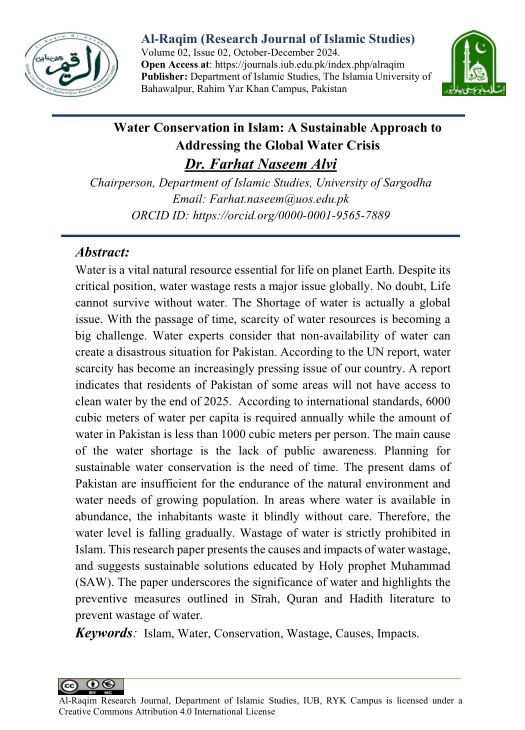Water Conservation in Islam: A Sīrah-Based Approach to Water Wastage Abatement
Keywords:
Islam, Water, Conservation, Wastage, SīrahAbstract
Water is a vital natural resource essential for life on planet Earth. Despite its critical position, water wastage rests a major issue globally. No doubt, Life cannot survive without water. The Shortage of water is actually a global issue. With the passage of time, scarcity of water resources is becoming a big challenge. Water experts consider that non-availability of water can create a disastrous situation for Pakistan. According to the UN report, water scarcity has become an increasingly pressing issue of our country. A report indicates that residents of Pakistan of some areas will not have access to clean water by the end of 2025. According to international standards, 6000 cubic meters of water per capita is required annually while the amount of water in Pakistan is less than 1000 cubic meters per person. The main cause of the water shortage is the lack of public awareness. Planning for sustainable water conservation is the need of time. The present dams of Pakistan are insufficient for the endurance of the natural environment and water needs of growing population. In areas where water is available in abundance, the inhabitants waste it blindly without care. Therefore, the water level is falling gradually. Wastage of water is strictly prohibited in Islam. This research paper presents the causes and impacts of water wastage, and suggests sustainable solutions educated by Holy prophet Muhammad (SAW). The paper underscores the significance of water and highlights the preventive measures outlined in Sīrah, Qurʾān and Ḥadīth literature to prevent wastage of water.

Downloads
Published
Issue
Section
License
Copyright (c) 2024 Dr. Farhat Alvi

This work is licensed under a Creative Commons Attribution-NonCommercial 4.0 International License.




